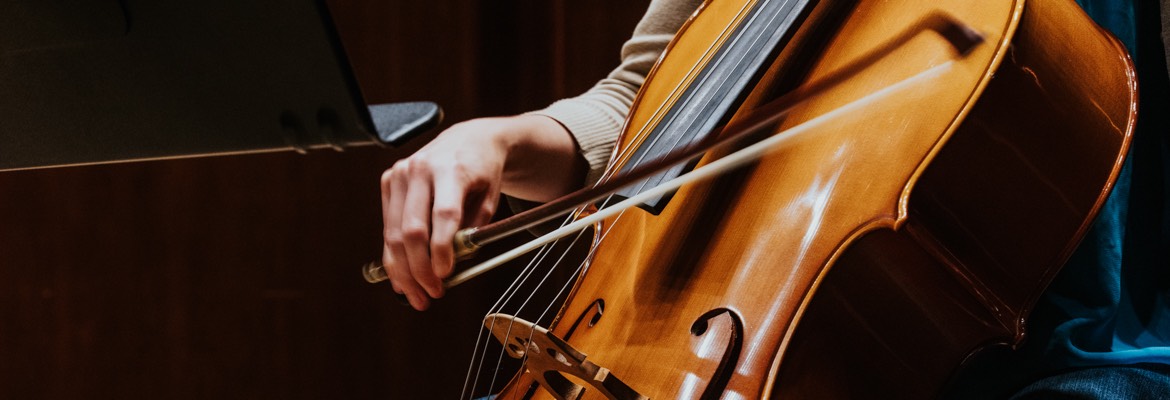Minor in Music

Overview
A music minor is available for those students interested in a formal, cohesive music curriculum but who are not interested in music as a major.
Courses
Below are the course requirements for this academic program. In addition to these program-specific requirements, all majors include Biola's traditional undergraduate core curriculum. For more program details, including a sample course sequence, visit Biola's academic catalog.
For those students interested in a formal, cohesive music curriculum but who are not interested in music as a major, a Music minor is available. The Music minor requires 21 credits, at least 6 of which must be upper-division.
GPA Requirements
Students must maintain a 2.0 GPA in the minor and receive a minimum grade of C in each required music course.
Curriculum Requirements
| Code | Title | Credits |
|---|---|---|
| Program Courses | ||
| MUSC 118 | Keyboard Skills I 1 | 1 |
| or MUSC 261 | Keyboard Sight Reading I | |
| MUSC 145 | Applied Music 2 | 4 |
| MUSC 153 | Musicianship I 3 | 1 |
| MUSC 154 | Theory I 4 | 3 |
| MUSC 160 | Essential Technologies for Musicians I | 1 |
| or MUSC 170 | Essential Technologies for Musicians II | |
| MUSC 200 | Performing Arts Forum 5 | 2 |
| MUSC 275 | Music Area Seminar 6 | 0 |
| Ensemble Courses 7 | ||
| Select 2 credits of ensemble, as appropriate to applied principal, from the following: | 2 | |
| Biola Chorale | ||
| Music Ensemble | ||
| Symphony Orchestra | ||
| Jazz Ensemble | ||
| Symphonic Winds | ||
| Vocal Jazz Ensemble | ||
| University Chorus | ||
| Women's Chorus | ||
| Worship and Popular Music Ensemble | ||
| Men's Chorus | ||
| Opera and Musical Production | ||
| Select 7 credits from the following electives: 7 | 7 | |
| Biola Chorale 8 | ||
or MUSC 002 | Music Ensemble | |
or MUSC 003 | Symphony Orchestra | |
or MUSC 007 | Jazz Ensemble | |
or MUSC 008 | Symphonic Winds | |
or MUSC 010 | Vocal Jazz Ensemble | |
or MUSC 011 | University Chorus | |
or MUSC 012 | Women's Chorus | |
or MUSC 013 | Worship and Popular Music Ensemble | |
or MUSC 014 | Men's Chorus | |
or MUSC 390 | Opera and Musical Production | |
| Essential Technologies for Musicians I | ||
or MUSC 170 | Essential Technologies for Musicians II | |
| Musicianship II | ||
| Theory II | ||
| Performing Arts Forum 8 | ||
| History of Film Music | ||
| Music Education: Brass | ||
| Music Education: Percussion | ||
| Music Education: Strings | ||
| Music Education: Woodwinds | ||
| Total Credits | 21 | |
- 1
MUSC 118 is for non-keyboard minors. Students may opt to take the Keyboard Placement Survey or will automatically be placed in the introductory-level course (MUSC 100). If Piano is your primary instrument, enroll in MUSC 261.
- 2
Must take 4 credits in principal instrument, composition or voice, through proficiency level 224. Sophomore B.A. music degree proficiency required. See Conservatory Office for standards description.
- 3
Students may take the Musicianship Placement Survey to potentially pass out of some or all of the Musicianship requirements. Students who do not take the survey will automatically be placed in MUSC 153 Musicianship I. Musicianship courses already taken at the college/university level will directly transfer for credit.
- 4
Students may take the Theory Placement Survey to potentially pass out of some or all of their Theory requirements. Students who do not take the survey will automatically be placed in MUSC 098 Introduction to Theory. The first two semesters of Written Theory courses already taken at the college/university level will directly transfer for credit.
- 5
Two semesters required.
- 6
Taken every semester in conjunction with MUSC 145 Applied Music.
- 7
Between ensembles and MUSC electives, at least 6 credits must be upper-division.
- 8
Must be taken an additional time for credit.